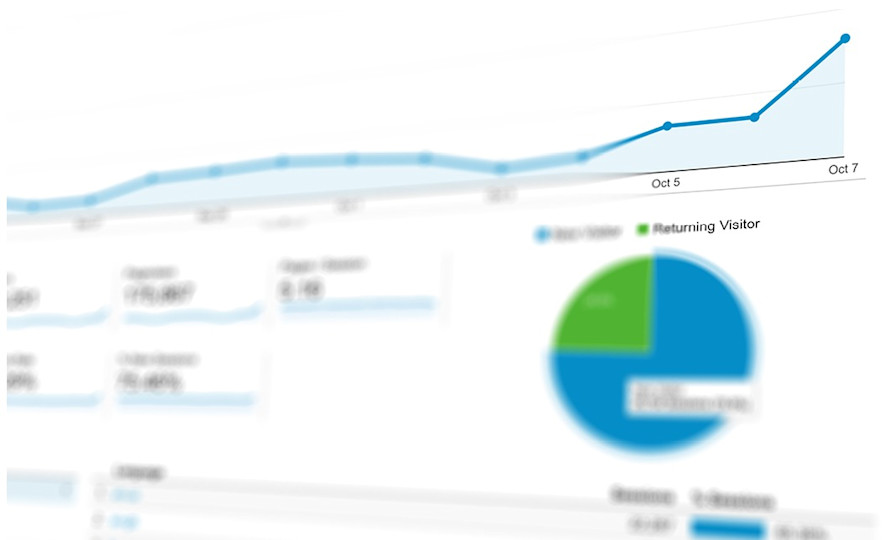How to analyze Google Analytics results
We’re always wondering how our content is doing, whether this means regularly checking the number of readers on a blog post, seeing how many new clients have followed us on social media or how many likes we’ve received on a tweet. These more subtle practices can give us some insight into how we’re performing.
However, if you’re searching for more in-depth results, it’s likely you’re using Google Analytics. Google Analytics offers you performance metrics that help you to plan for the future. But how do you actually analyze this data?
Using Google Analytics is an excellent way to inform blog posts, make sure content marketing strategies are on track as well as offering a way to plan ahead. Therefore, the feedback from this tool is paramount to your success on the web. Let’s get started at understanding how to analyze your Google Analytics results.
Here’s how to understand your Google Analytics results
What does Google Analytics do?
For the majority of content marketers, Google Analytics is the choice tool for analyzing and understanding how one’s website is performing. There are many reasons behind its popularity, including the fact that it’s free, intuitive and an impressive resource for picking apart what is working and what isn’t when it comes to the strategies you have in place.
Analytics will offer you information on who is coming to your website, how they’re finding your site, the devices they’re using, the pages they visit and so forth. Basically, GA uses JavaScript code placed into the backend of web pages you're looking to track.
This code is combined with data collection and a processing engine which work together to create a unique data report. As mentioned, the data collected will let you know how specific pages of your website are performing.
If you’re looking for a more in-depth explanation of how Google Analytics works, you should check out our article on the subject.
How to analyze your Google Analytics data?
Now that you’ve got a better idea of what Analytics is about, we can discuss how to confront the data you’re provided by the tool in a way that makes it easy to understand as well as useful to your marketing plan moving forward.
Let’s start from the beginning and consider the online objects, goals and KPIs of your marketing plan. It’s hard to analyze data if you don’t first consider all the fundamental aspects of your website, so make sure you know what you’re looking for when analyzing your results. In some cases, you won’t know what you need until you see the data presented, but it’s good to go in with a few concrete goals and intentions in mind.
Looking for a Google Analytics expert?
Contact us so we can refer you to specialists in our network
Overview and demographics
Now, opening GA results, you can begin with the Channel Overview Report. This provides the baseline insight into what is working for you and what isn’t. This report is broken down into search categories including Organic Search, Direct, Referral, and Social. These categories are then broken down into how your website is performing and offering insight into conversion rate, bounce rate and so on. Further, you’ll be able to see how many of your visitors are new and how many are returning.
If you enable GA's advertising features, you're also offered specific demographics that will show your visitors' age, gender, and interest based on things they've previously purchased online as well as places they've been. This will give you even more information on your target customer and how to create ads that will appeal to them most.
Browsing Device
Next, you should look at the data that offers information regarding how people are browsing: who’s visiting from a desktop and who’s visiting from a mobile device? It’s paramount that your website is able to function on all devices equally, as mobile traffic has surpassed that of the desktop. Monitoring the volume and engagement of visits from the mobile device is crucial.
Look at what portion of the traffic comes from a mobile device as well as what percentage of those are bouncing off. Looking at these results can have a serious impact on your site ranking in Google.
Let’s look at some of the more specific GA data that you should examine for your website to perform better.
Site Speed
Recently, site speed has become one of the most important ranking factors, as Google will push down websites with poor site speed and load times. Thus, this metric is important to track by way of Google Analytics. This is because site speed has a huge impact on user experience and thus, the visibility of your website. GA Site Speed data will offer you a page score as well as PageSpeed suggestions, and this information will allow you to further optimize your website.
Content Groupings
Content Grouping is one of the more advanced features offered by Google Analytics. This tactic allows you to group your content into common themes so that you can create meaning in your data analysis. This will help you to understand topics that perform better or are more engaging for readers and can also offer content deficiencies.
Setting up this feature isn’t too complex, and can be completed by creating rules which define your groups. You choose the criteria for your groupings by defining the rules based on words found on pages, in URLs and so forth.
This method may be slightly limiting in performing an analysis. So, if you’re looking to analyze beyond the words of your content, this content grouping analysis can be performed by placing code into the backend. Google will offer you code snippets after you have defined your grouping, and these can be used to track specific web pages.
With either tactic, after a few days, Google Analytics will begin to push this data into your account.
Paid versus Organic search on Google Analytics
Analyzing the results of how your organic search versus your paid search will offer you insight into future search strategies as well as if you’re investing too much money into these tactics. It’s worth mentioning that not every paid search metric will be offered through Google Analytics. However, what is offered will definitely allow you to make further decisions regarding how to gain more visibility and how people are searching for your website.
Benchmarking
GA's Benchmarking is a great way to see how your website is holding up against others in your industry. This comparison is provided by a compiling of industry data.
The way your site is performing can be compared within many categories, and this includes location, device, user flow, and channels. This GA tool is exceptionally valuable to gain more information about the industry your website exists within as well as your place within it.



